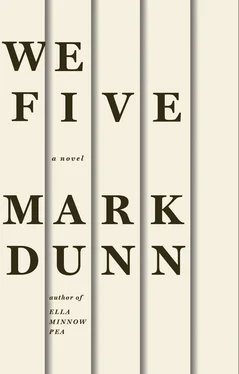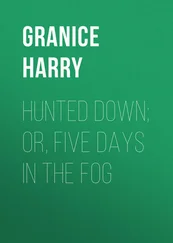“And you’re totally off your nut, Castle.” Cain stood up from the table. “You know, fellows, some of these challenges have been silly, and yes, I’ll admit my Shakespeare stunt was pretty punk, but we’ve never done anything before that could end up hurting somebody. This new challenge takes us to a place we have no business going. It’s something I can’t go along with, and I would hope the rest of you will come to your senses and reject it too.”
“Sit down, Pardlow,” said Will with sudden severity.
The two men looked at one another. Something passed between them, unknowable to the other young men at the table. Cain dropped obediently into his seat.
Will continued to look squarely at Cain, as if there were no one else present at the table. “You’re going to play the game, Pardlow. Or I’m going to tell what it is I know. And what it is I know, if it gets known by certain other people, could put you in a bad spot.”
“Why are you doing this, Will?”
“For your own good. You know exactly what I’m talking about.”
“Somebody mind telling us what’s going on here?” asked Jerry. Tom and Pat nodded, all three now caught off guard by this inexplicable turn in the conversation.
Will looked at Jerry and shook his head. “This is between Cain and me. And Cain — I intend to keep my promise, but only if you play. If you don’t play, all bets are off.”
Cain closed his eyes. His voice softened to near whisper. “I still don’t understand, Will. I don’t understand why this is so important to you.”
“If you don’t know why, then you’re worse off than I thought.”
Cain’s eyes popped open. He rose to stand next to his chair. One by one, he looked into the faces of the four young men whom he’d considered his friends. He wasn’t sure how to define his relationship with them now, but he knew in any event he’d have to play the game. The consequences for not playing were simply too serious to be ignored.
“I’ll do it,” he finally said, his words almost inaudible. And then he walked away without taking his tray.
Diners were supposed to dispose of their trays. This was one rule Cain felt he could break without consequence. For someone like Cain Pardlow, rules like this one — rules one could disregard — didn’t come along very often.
After he left, Jerry turned to Holborne and said simply, “Okay. Now tell us.”
And Will replied just as simply, “No. I keep my word.”
And then he left the dining hall as well.
London, England, October 1940
“It’s very pretty, Mum.”
“No, love, come look at it in the light. See how it sparkles.”
“I’m surprised he could afford to buy you a ring.”
“Did you not tell me you’ve decided to be a good girl about this?”
Maggie took the last bite of her broiled plaice. It wasn’t her favourite fish, but she indulged her mother by eating it with some demonstration of appreciation. After all, Clara had stood in a forty-minute queue outside the fish shop to buy it. “I am being a good girl. But I’ve still held on to that wee bit of hope that — well, now it just seems inevitable.”
“Nothing is inevitable, Maggie, dear. But this comes close. And you’re going to continue to be a good girl, because you told me that putting off this marriage was just what you and Molly wanted.”
“What I wanted — and still want — is for you not to get married at all. But I’ve agreed to this compromise.”
“Then start being nice. It will be very wearing on me if you intend to continue with this moping and moaning until the end of the war.”
Maggie got up from the table. She picked up her plate and cup to carry into the kitchen.
“No dessert?” asked Clara, over her shoulder. “I made orange whip and gingerbread.”
“I’ll have a slice of gingerbread later,” answered Maggie from the kitchen. A moment later she returned to clear away more of the tea dishes. “I’d rather not be the last to arrive at Jane’s. After being the one largely responsible for Molly and Carrie and me being so late to work on Monday, I am now called — and I don’t think this is an affectionate jest—‘the late and not-so-great Maggie Barton.’”
Mrs. Barton’s harrumph was clearly audible. “Well, you didn’t spend the morning arguing with a lamp post, dear. Molly played her part as well. Never you mind about the dishes tonight, dear. I’ll wash them.” Clara sighed. “But I do wish you’d wait just a few minutes to say something sweet and congratulatory to Dr. Osborne. I’m expecting him at any moment.”
“If I’m still here when he comes I’ll be polite.”
It took two more trips for Maggie to take away the rest of the dishes from tea. Clara sat thinking whilst Maggie ran hot water into the kitchen basin to give things a soak. “I must say, Maggie,” said Clara, raising her voice to be heard through the doorway, “that the begrudging way you’ve been accommodating me is just as unpleasant as if you were still standing squarely against the marriage for all time. You really should be more like Chamberlain and appease me with a fixed smile.”
“Which you would see straight through,” rebutted Maggie, her own words amplified for carriage into the dining room. “The fact is: I’m hanged if I do and hanged if I don’t. What do you fancy, Mum? That my feelings about this marriage should change with the snap of a finger?”
“What I fancy , to be perfectly honest, is a different daughter.”
“I’m sorry, old woman, but it looks like you’re stuck with me. And I’m stuck with you. Even if I marry. Because I don’t intend to be one of those unhappy children that blots her mum out of her life forever.”
“I suppose I should thank you for that.” Clara sighed again. Sometimes her sighs had a way of working themselves into yawns. This one seemed of that variety. “What are you girls getting together for, anyway? I asked Dr. Osborne if Molly—”
“You don’t have to keep calling him ‘Dr. Osborne.’ First, he isn’t a doctor. And second, he’s the man you plan to marry. Will you still be calling him ‘Dr. Osborne’ on your rose-petal-strewn honeymoon bed?”
“I haven’t decided. And don’t be vulgar.” Clara smiled privately. “I must say that part of me has grown rather accustomed to it — calling him that — not that it’s any of your business how the doctor and I choose to refer to one another.”
“You asked him what about Molly? Finish your sentence. I don’t have all night.”
“Then stop pottering with those dishes! I told you I’d wash them.”
“Oh, and then have you telling my future stepfather when he shows up tonight what a terrible daughter I am to do no chores round the house — even though I bring in most of the money we have, thanks to my job at the factory, and even though every time you climb into bed with one of your dizzy spells, it is I who must do all the marketing and cooking and scouring and pushing of the bloody Hoover from one dirty carpet to another until you’re up and about again. But you won’t tell him that , will you? You’ll say I’m lazy and a perfectly beastly excuse for a daughter because that’s what comes easiest to your tongue.”
“I never said anything of the sort to anyone! I appreciate every little thing you do for me.”
“Of course you do,” said Maggie dryly to herself. She stopped chinking plates and saucers. Then she said, “You asked him what?”
“What’s that?”
“You asked Mr. Osborne what? You just said—”
“Stop shouting at me.” Mrs. Barton left the table and stepped into the kitchen. She sat down at the little breakfast table snuggled against the wall. “Now would you listen to us? We sound like a couple of Newham ironmongers’ wives.” Clara took a deep breath to calm herself. “I was going to say that I had asked Michael if Molly was coming along with him tonight and he said no, she was going to Jane’s house with the rest of you. So now I am asking you : what is it that requires the five of you to gather yourselves together tonight when you’ve already seen one another for eleven full hours at the factory? I ask because Michael is bringing a bottle of port, which he’d put by for a special occasion. We’re going to raise a glass to our future happiness. And it would be nice if—”
Читать дальше












